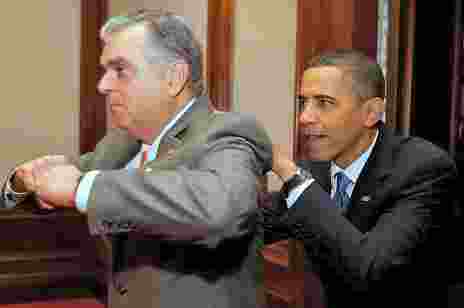
After more than four years as U.S. Secretary of Transportation during the Obama administration and 35 years in government, Republican Ray LaHood is taking time to consider various options and opportunities and plans to decide his future in the next few weeks. But he notes that whatever his future holds, “our home is Peoria.”
“After Labor Day, we’ll figure out what we’ll do,” he said. “I’m taking the summer to listen to people – talking to a lot of people. We’ll stay involved, maybe volunteer, maybe help with some not for profit or some other board, [so] we’re going to be spending a lot of time there.”
LaHood’s spent a lot of time creating a formidable transportation legacy: fixing or building thousands of bridges and hundreds of thousands of miles of roads; helping create 65,000 jobs from government’s economic stimulus; launching high-speed rail; and leading on consumer-friendly initiatives ranging from better fuel efficiency, bicycle-sharing programs and auto recalls to air safety monitoring, the successful “Cash for Clunkers” program and distracted driving measures.
His leadership arguably stems from a lesson he took from decades of public service.
“I learned that you can be successful if you hire good staff and let them do the job,” he said. “I tried to hire based on their professional qualifications, to build a team and give them the leverage to do what they do best.
“I tried to mentor them, give them guidance, so they could use their talents [to] do their jobs,” he continued.
That skill set doesn’t disguise LaHood’s disappointment in what he sees as current politics’ lost art of compromise and lack of civility. Before his time with the Cabinet, LaHood was Congressman from the 18th District for 14 years and an aide to U.S. Reps. Bob Michel and Tom Railsback for 17 years.
“It’s never been like this,” he said. “On election night in 1994 I said I’d been elected to represent all of the people of the district: veterans, seniors who need help with Social Security, someone who wants to become a citizen – [without] asking about their politics, if they’re registered, if they voted or whatever.”
After attending St. Bernard’s grade school and Spalding Institute, LaHood went to Canton Junior College (now Spoon River College) and Bradley University; taught at St. Joseph’s school in Pekin, Holy Family school in Peoria, and Oak Grove West in Bartonville; and worked at the Rock Island County Youth Services Bureau. He was Railsback’s administrative assistant from 1977-82, was appointed to fill a State Representative vacancy in 1982, and later that year joined Michel’s staff.
Such experience and an appreciation for the Peoria area’s political heritage seem to have helped the 67-year-old Peoria native put current politics into perspective.
“Bipartisanship is part of the rich political history of central Illinois, going back to Lincoln, who got Congress to pass Emancipation, [Pekin Republican and U.S. Senate Minority Leader] Everett Dirksen – the Civil Rights Act never could’ve happened without him – and Bob Michel, who worked with Tip O’Neil and Ronald Reagan and Bill Clinton,” LaHood said. “This area has sent some good officials to Washington and Springfield. You have to work with people and be willing to compromise. That’s held us in good stead.”
Washington “is increasingly distracted by political sideshows and name-calling, which are hurting its ability to effectively address our most pressing issues,” LaHood wrote. “Those who disagree with us are not bad people.”
Now, he told the Community Word, “Thirty or forty people, primarily Republicans in the House, [are] a problem. At this point I think it’d be difficult for people like Eisenhower or Reagan or Nixon – even George H.W. Bush or George W. Bush – to be able to do what they did. [And] Eisenhower was such a visionary. Look at the infrastructure he built: the Interstate system that meant so much in economic development and opportunities.”
Speaking the day before former House Speaker Newt Gingrich was scheduled to appear at a fund raiser for his son, State Sen. Darin LaHood (R-37th Dist.), Ray LaHood remembers that he was one of just three Republicans who in 1994 didn’t sign Gingrich’s “Contract with America” agenda.
He holds no grudges, he said.
“We’re elected to do what’s right,” he said. “You can have principled stands and a philosophy, [but] what we do is be helpful; make government work.”
Another example is Hillary Clinton, he conceded. Although LaHood presided over the 1998 impeachment of President Bill Clinton, Secretary of State Hillary Clinton was helpful when LaHood’s other son, Sam LaHood, was detained in Egypt for his pro-democracy work there.
“I worked with all of the Cabinet when I needed opportunities,” he said. But “she knew I was there for the same reason [as her]: to help government perform the way it’s supposed to.”
The White House also knew.
Last April, President Obama thanked LaHood for his hard work and dedication to public service: “He is a good man,” Obama said, “and has been an outstanding public servant and a model for the kind of bipartisan approach to governance that I think we need so badly.”

Recent Comments